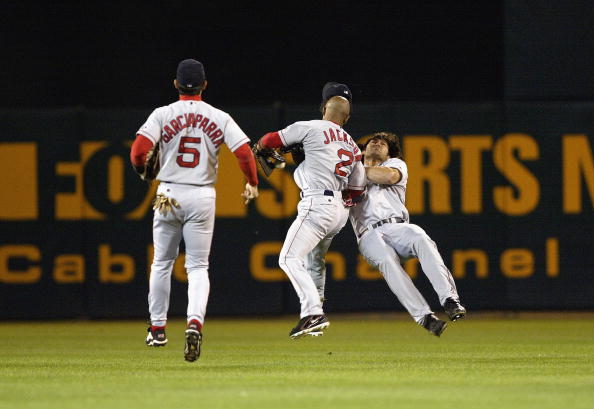Moving ahead to the keystone position, these guys are a far cry from Bobby Doerr and Dustin Pedroia. Here are the worst Red Sox second basemen of all-time.
Damian Jackson
Jackson spent one season in Boston, playing all over the field as a utility and replacement player. He batted .261 for the season, not too bad, but his OPS was a measly .617. Admittedly, my distaste for Damian Jackson was just as much Grady Little’s fault as it was Damian Jackson’s. Little used to bring Jackson into games late, despite the fact Jackson often screwed up. Little would pinch-run Jackson, and he would get picked off or caught stealing. He would bring Jackson in for defense, only to have him commit errors. The man did not learn.
Jackson was caught stealing eight times in his one season with the Red Sox, a number that placed him in the worst ten for the league. Little again used Jackson as a pinch-runner in the playoffs. In game one of the ALCS against the Yankees, Jackson pinch ran for Todd Walker in the eighth inning and subsequently got picked off first base.
As for the fielding, Jackson had a mediocre .960 fielding percentage at second base for the Red Sox. He made nine errors amongst all the positions he played that season, making five of them at shortstop with an .881 fielding percentage. He was not a good fielder, yet Little liked to bring him in for defense. In fact, Jackson twice finished in the top five in the National League for errors made before he ever played in Boston. In the 2003 ALDS, Jackson crashed into Johnny Damon going after a pop-up, giving Damon a concussion and causing him to be carted off the field. This play happened two plays after Jackson entered the game as a defensive replacement.
Johnny Damon & Damian Jackson (AP photo)
Ski Melillo
Melillo played for the Red Sox during the 1930’s. Traded for during the 1935 season, Melillo spent the next two seasons as the Red Sox main second baseman. He wasn’t dreadful that first season, batting .260. However, Melillo had nearly no power, posting a .310 slugging percentage. The following season, with his average dropping off to .226, Melillo posted a lousy .287/.287/.575 triple slash line.
In parts of three seasons with Boston, Melillo posted a sub .300 slugging percentage. He batted .245 with a single homer, posting a .608 OPS. If one thinks you can apply a number value to anyone, let alone someone from 80 years ago, Melillo posted a -2.3 WAR. This number was a dreadful -1.9 in 1936. He was definitely not worthy of a starting job.
Moose Solters (left) was traded by the Red Sox to the Browns for Ski Melillo (right) in 1935
Jose Offerman
Offerman was given a four-year 26 million dollar contract by the Boston Red Sox before the 1999 season. His on-base skills were supposed to help replace Mo Vaughn. Offerman had batted .315 with a .403 on-base percentage the previous season. Offerman also led the league in triples with 13 while stealing 45 bases.
Offerman’s good play continued into his first season with the Red Sox. In 1999 he batted .294 and led the league with 11 triples. He had a .391 on-base percentage while making the All-Star Game. If there was a disappointment to his season it was getting caught stealing 12 times in 30 tries. Unfortunately, that was the best season he had stealing bases for the Red Sox.
The next season Offerman’s play fell off. Jose would bat .255 in his second season with the Sox, getting on base at a .354 clip. However, even with the walks boosting his on-base percentage, Offerman didn’t put it to much use. He attempted eight steals that season and was caught all eight times. In 2001 his average rebounded a bit to .267, but he actually got on base less. He also tripled just three times and stole just five bases. Finally, in 2002 he was sent to Seattle after batting just .232 with a .650 OPS.
Offerman was not a horrible player, but he failed to live up to his contract and expectations in having only one good season. He would bat .268 with a .743 OPS during his four seasons. As for his stealing ability, it disappeared in Boston. Despite stealing 45 bases in 1998, Offerman only stole 31 bags over four years with the Red Sox and was caught 27 times.
Yankees second baseman Chuck Knoblauch applied a phantom tag on Jose Offerman, who was called out.
(Boston Globe/ ELISE AMENDOLA/AP)
Dishonorable Mentions:
Dalton Jones, Mark Lemke, Doug Griffin, Chuck Schilling
